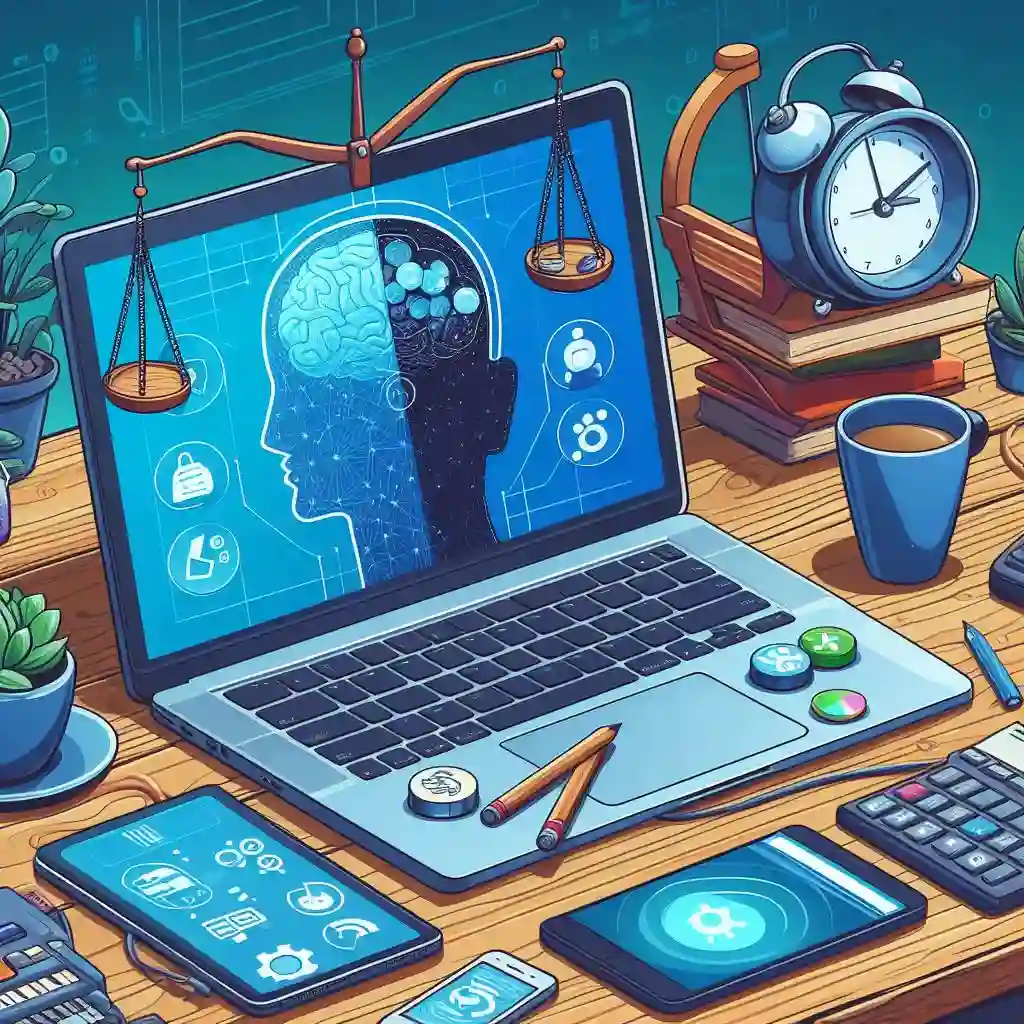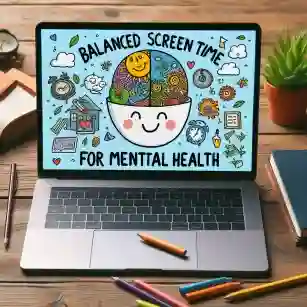In our digital age, screens are everywhere, prompting vital questions about their influence on mental health- How screen time affects mental health? It’s crucial to comprehend how screen time affects mental health as we tread the delicate balance between the advantages of technology and the potential harm to our psychological well-being. Let’s explore the human side of this digital connection.
Key Points
1. Stay Alert to Digital Distractions: 50% of kids and 75% of parents feel distracted during conversations. Give time to bridge the digital gap!
2. Screen-Free Bonding: Make sit-downs and meal device-free rituals with your children. It’s about creating meaningful moments.
3. Unplug to Connect: Ditch the devices, embrace the present, and rediscover genuine connections. Observe, wander, and savor life.
4. Blue Light Bedtime Ban: Say no to screens emitting blue light before bedtime. Protect your sleep for a refreshed you.
5. Game Together: Instead of forbidding online games, join in with your children. Play, bond, and discuss their digital experiences.
6. Time Management for Techies: Help your children plan their time wisely, balancing essential tasks and cherished activities. Avoid the screen abyss for a fulfilling routine.
Understanding Screen Time
Screen time encompasses various activities, from scrolling through social media to working on digital devices. Its prevalence in today’s society raises questions about its impact on mental health. As screens dominate our daily lives, the diverse nature of these activities adds complexity to the issue. Researchers are closely examining the relationship between screen time and mental well-being, considering factors like activity types and duration. It’s crucial to recognize both the positive aspects, such as education and communication, and the potential mental health risks. In the following sections, we’ll explore these dynamics and suggest strategies for maintaining a healthy balance in our screen-centric lives.
Average of Screen Time of American Kids & Teens, By Age
| Age Group (in years) | Daily Average of Screen Time | Year Data Were Collected |
|---|---|---|
| Under 2 | 42 minutes per week | 2017 |
| 2-4 | 2 hours per week | 2017 |
| 5-8 | 2 hours per week | 2017 |
| 8-12 | 7 hours per day | 2019 |
| 13-18 | 8 hours per day | 2019 |
Positive Effects of Screen Time
In dispelling common misconceptions, it’s important to acknowledge that screen time holds positive attributes. Rather than being inherently detrimental, engaging with screens can offer substantial educational advantages. From online courses to interactive learning platforms, screens provide a gateway to a wealth of knowledge. Furthermore, the digital landscape fosters cognitive skill enhancement, encouraging problem-solving and critical thinking. The key lies in purposeful and mindful use, where individuals harness the potential benefits of screen time for their intellectual and educational growth.
Negative Effects of Screen Time
While screens undoubtedly offer numerous benefits, it’s vital to confront the reality of potential drawbacks associated with excessive usage. Extended screen time not only poses significant mental health risks, impacting social interactions and emotional well-being, but it can also lead to a myriad of physical issues. From obesity and sleep problems to chronic neck and back problems, the effects extend beyond the psychological realm. Moreover, excessive screen use has been linked to depression, anxiety, lower test scores in children, digital eye strain, and impaired sleep. Recognizing these downsides is essential in cultivating a balanced approach to screen use, promoting both mental and physical well-being.

The Link Between Screen Time and Mental Health
Research findings emphasize a notable correlation between extended screen time and mental health issues. Identifying associated risk factors is essential for effective prevention and management of potential challenges. Negative effects on mental health are evident, including sleep deprivation, impaired social skills, weakened emotional judgment, strain on eyes and body, lower self-esteem, sleep disruption, desynchronization of the body clock, and desensitization of the brain’s reward system. Understanding these connections empowers individuals to make informed choices about their screen habits, ultimately fostering better mental well-being in the digital age.
Balancing Digital Life: Screen-Free Break
Creating a healthy digital lifestyle involves mastering screen time management strategies, which include setting clear boundaries and incorporating screen-free activities into daily routines. During Screen-Free Week, there are numerous engaging options such as taking a book outside, exploring local museums, enjoying an ice cream cone, helping neighbors with yard work, or going on a nature scavenger hunt. Embracing these activities enhances the balance between digital engagement and offline experiences, contributing to overall well-being.
Impact on Different Age Groups
The influence of screen time differs among age groups, presenting unique challenges for children, adolescents, adults, and the workforce. Tailored solutions are essential to address the distinct needs and concerns each group faces in the digital age. Understanding these variations is crucial for implementing effective strategies that promote healthy screen habits and overall well-being across diverse demographics.
Technological Innovations for Mental Well-being
Thankfully, technology offers solutions to enhance mental well-being. Apps designed to promote mindfulness and wearable devices for self-monitoring play a significant role in supporting and improving mental health. Embracing these technological innovations empowers individuals to proactively manage and prioritize their mental well-being in our digital age.
Personal Stories and Experiences
Genuine stories from individuals managing screen time provide valuable insights into the real-world challenges of the digital age. Sharing lessons learned fosters a supportive community, collectively navigating and adapting to the complexities of our screen-centric lifestyles. These personal narratives contribute to a broader understanding and encourage others to adopt effective strategies for a balanced and mindful approach to technology use.
Balancing Screen Time in Work and Leisure
Navigating a digital work environment poses unique challenges for professionals. Implementing tips for balancing screen time between work and leisure activities is crucial for maintaining a healthier and more sustainable lifestyle. Striking the right equilibrium ensures optimal productivity at work while preserving well-deserved moments of relaxation during leisure hours.
The Role of Parents and Educators
Parents and educators play a pivotal role in molding healthy screen habits in children. The integration of digital education in schools goes a step further, equipping the younger generation with the necessary tools for responsible and mindful technology use. Together, these efforts lay the foundation for a generation that navigates the digital landscape with awareness and balance.
Screen Time and Sleep
The undeniable impact of screen time on sleep quality prompts a crucial consideration for our nightly routines. Crafting bedtime rituals and minimizing screen exposure before sleep emerge as vital practices for guaranteeing a truly restful night. Why does it matter? Well, screen time before bed can throw a wrench into the gears of sleep, affecting both its quality and duration. How? By suppressing melatonin production—the sleep-wake cycle maestro—and revving up brain stimulation and heart rate, making the quest for a serene slumber an uphill battle.
Moreover, it has the potential to diminish REM sleep, an essential stage crucial for memory and learning. The result? Grogginess, moodiness, and lackluster cognitive performance the next day. So, let’s embark on a journey of mindful screen use to ensure each night’s rest is nothing short of rejuvenating.
Stay Connected, Stay Healthy
In the vast digital landscape, the importance of staying connected offline cannot be overstated. Cultivating a supportive community beyond the confines of screens is a cornerstone for fostering mental and emotional well-being. Amidst the virtual interactions, the richness of genuine, face-to-face connections stands as a powerful contributor to a healthier and more fulfilling life. So, let’s weave a tapestry of real-world relationships, strengthening the bonds that nurture our overall well-being beyond the pixels and devices that surround us.
Impact of Screen Time on Brain Development
In today’s digital age, the relationship between screen time and brain development is a mounting concern. With technology deeply ingrained in our daily lives, comprehending how screen time influences the developing brain becomes crucial for informed decision-making and fostering healthy cognitive growth.
The impacts of excessive screen time on children are multifaceted. It can lead to an inability to pay attention and think, contribute to poor eating habits and behavioral problems, language delays, disrupted sleep patterns, impaired executive function, lesser parent-child engagement, lower self-esteem, and elevate the incidence and severity of mental health issues and addictions.
Particularly alarming are findings that children with more than two hours of daily screen time tend to score lower on thinking and language tests. Brain scans further reveal a premature thinning of the cortex in kids with extensive screen exposure. These insights emphasize the need for mindful screen use to safeguard the cognitive development and overall well-being of the younger generation.
Wrap Up Time
Understanding how screen time affects mental health underscores the necessity for a balanced approach. By comprehending both the positive and negative aspects, embracing digital mastery, and cultivating offline connections, individuals can navigate the digital world with mindfulness. Striking this balance is the key to harnessing the benefits of technology while safeguarding mental and emotional well-being in the ever-evolving landscape of the digital age.
Frequently Asked Questions (FAQs) How Screen Time Affects Mental Health
Q: Is all screen time harmful to mental health?
A: While excessive screen time can have negative effects, purposeful and mindful use can also have positive impacts.
Q: How can parents manage their children’s screen time?
A: Parents can set clear boundaries, encourage outdoor activities, and engage in open communication about responsible technology use.
Q: Are there recommended screen time guidelines for different age groups?
A: Health organizations provide general guidelines, but individual needs may vary. It’s crucial to assess screen time in the context of overall well-being.
Q: Can technology help improve mental health in the digital age?
A: Yes, there are various apps and tools designed to promote mindfulness, manage screen time, and enhance mental well-being.
Q: What steps can professionals take to balance screen time in a digital work environment?
A: Professionals can schedule breaks, implement the 20-20-20 rule, and establish clear boundaries between work and leisure to maintain a healthy screen balance.
